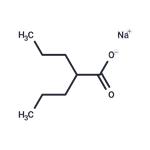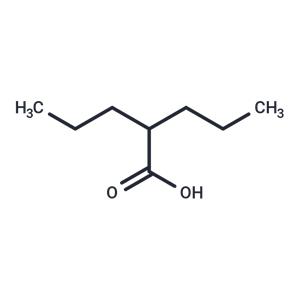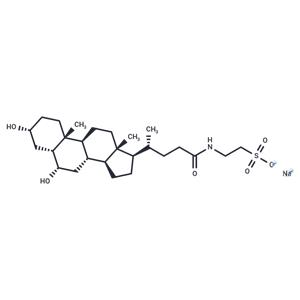
Valproic acid sodium salt NEW
| Price | $42 |
| Package | 500mg |
| Min. Order: | |
| Supply Ability: | 10g |
| Update Time: | 2024-11-20 |
Product Details
| Product Name: Valproic acid sodium salt | CAS No.: 1069-66-5 |
| Purity: 99.78% | Supply Ability: 10g |
| Release date: 2024/11/20 |
Product Introduction
Bioactivity
| Name | Valproic acid sodium salt |
| Description | Valproic acid sodium salt (Sodium Valproate) is the sodium salt form of valproic acid with anti-epileptic activity. Valproic acid sodium salt is converted into its active form, valproate ion, in blood. Although the mechanism of action remains to be elucidated, Valproic acid sodium salt increases concentrations of gamma-aminobutyric acid (GABA) in the brain, probably due to inhibition of the enzymes responsible for the catabolism of GABA. This potentiates the synaptic actions of GABA. Valproic acid sodium salt may also affect potassium channels, thereby creating a direct membrane-stabilizing effect. |
| Cell Research | Valproic acid is dissolved in DMSO. In brief, 5×105?cells are seeded in 96-well microtiter plates for MTT assays. After exposure to the designated doses of Valproic acid for the indicated times, MTT solution [20 mL: 2 mg/mL in phosphate-buffered saline (PBS)] is added to each well of the 96-well plates. The plates are additionally incubated for 3 h at 37°C. Medium is withdrawn from the plates by pipetting and 200 mL DMSO is added to each well to solubilize the formazan crystals. The optical density is measured at 570 nm using a microplate reader. |
| Kinase Assay | The activity of caspase-3, -8 and -9 is assessed using the caspase-3, -8 and -9 colorimetric assay kits, respectively. In brief, 1×106?cells in a 60-mm culture dish are incubated with 10 mM Valproic acid for 24 h. The cells are then washed in PBS and suspended in 5 volumes of lysis buffer provided with the kit. Protein concentrations are determined using the Bradford method. Supernatants containing 50 μg total protein are used to determine caspase-3, -8 and -9 activities. The supernatants are added to each well in 96-well microtiter plates with DEVD-pNA, IETD-pNA or LEHD-pNA as caspase-3, -8 and -9 substrates and the plates are incubated at 37°C for 1 h. The optical density of each well is measured at 405 nm using a microplate reader. The activity of caspase-3, -8 and -9 is expressed in arbitrary absorbance units. |
| In vitro | In the MT-450 rat mammary carcinoma model, Valproic acid exhibits a delayed effect on the growth of primary tumors. |
| In vivo | In cultured cells, Valproic acid induces histone deacetylation similarly to the histone deacetylase inhibitor Trichostatin A, and like Trichostatin A, activates the transcription of various exogenous and endogenous promoters. However, in the embryos of vertebrates, both Valproic acid and Trichostatin A exhibit teratogenic effects without activating transcription. Valproic acid directly inhibits histone deacetylases through distinct pathways, with an IC50 of 0.4 mM for HDAC1. It inhibits cell proliferation or survival in F9 and P19 teratocarcinoma cells, as indicated by a decrease in [3H]thymidine incorporation, and promotes peroxisome proliferation in the liver of rodents. At a concentration of 1 mM, Valproic acid inhibits the release of Gal4 fused with N-COR, TR, or PPARδ in cells expressing the DNA binding domain of the glucocorticoid receptor and the ligand-binding domain of PPARδ, along with a GR-controlled reporter gene fusion. Valproic acid reduces the accumulation of acetylated histones and inhibits HDAC activity. Furthermore, Valproic acid induces specific types of differentiation, characterized by decreased proliferation, morphological changes, accumulation of the transcription factor AP-2, and expression of marker genes, where AP-2 serves as a potential marker for neuronal or neuroepithelial-like differentiation in F9 teratocarcinoma cells. |
| Storage | Powder: -20°C for 3 years | In solvent: -80°C for 1 year | Shipping with blue ice. |
| Solubility Information | DMSO : 50 mg/mL (300.84 mM) H2O : 16.6 mg/mL (100 mM) |
| Keywords | bipolar disorder | Valproic acid | anticonvulsant | Valproic acid sodium salt | Mitophagy | hepatic fat accumulation | degradation | Histone deacetylases | HIV | HDAC | Mitochondrial Autophagy | Notch | inhibit | Apoptosis | anticancer | headaches | small cell lung cancer | Inhibitor | Human immunodeficiency virus | proteasomal | Notch1 | Valproic acid sodium | migraine | Autophagy | epilepsy | Endogenous Metabolite | SCLC |
| Inhibitors Related | Stavudine | Emtricitabine | Sodium 4-phenylbutyrate | Hydroxychloroquine | Guanidine hydrochloride | Lamivudine | Paeonol | Naringin |
| Related Compound Libraries | Pain-Related Compound Library | Bioactive Compound Library | Anti-Neurodegenerative Disease Compound Library | Membrane Protein-targeted Compound Library | Anti-Cancer Clinical Compound Library | FDA-Approved Drug Library | Anti-Cancer Approved Drug Library | Anti-Aging Compound Library | Bioactive Compounds Library Max | Ion Channel Targeted Library |
Company Profile Introduction
Target Molecule Corp. (TargetMol) is a global high-tech enterprise, headquartered in Boston, MA, specializing in chemical and biological research product and service to meet the research needs of global customers.
TargetMol has evolved into one of the biggest global compound library and small molecule suppliers and a customer based on 40+ countries. TargetMol offers over 80 types of compound libraries and a wide range of high-quality research chemicals including inhibitors, activator, natural compounds, peptides, inhibitory antibodies, and novel life-science kits, for laboratory and scientific use. Besides, virtual screening service is also available for customers who would like to conduct the computer-aided drug discovery.
You may like
Recommended supplier
| Product name | Price | Suppliers | Update time | |
|---|---|---|---|---|
| $5.00/1KG |
VIP4Y
|
Hebei Chuanghai Biotechnology Co,.LTD
|
2024-08-21 | |
| $75.00/1kg |
VIP1Y
|
Hebei Zhuanglai Chemical Trading Co.,Ltd
|
2024-05-29 | |
| $10.00/1kg |
Ouhuang Engineering Materials (Hubei) Co., Ltd
|
2024-04-24 | ||
| $0.00/1kg |
VIP5Y
|
Hebei Yanxi Chemical Co., Ltd.
|
2023-10-10 | |
| $0.00/1kg |
VIP3Y
|
Nanjing Kaitian Chemical Co., LTD
|
2023-02-10 | |
| $1.10/1g |
VIP4Y
|
Dideu Industries Group Limited
|
2021-07-22 | |
| $15.00/1KG |
Zhuozhou Wenxi import and Export Co., Ltd
|
2021-07-08 | ||
| $105.00/1KG |
VIP4Y
|
Baoji Guokang Bio-Technology Co., Ltd.
|
2021-06-02 | |
| $0.00/1Kg/Bag |
VIP4Y
|
WUHAN FORTUNA CHEMICAL CO., LTD
|
2021-06-02 | |
| $80.00/1KG |
Hebei Runbin Biotechnology Co. LTD
|
2020-09-10 |
- Since: 2011-01-07
- Address: 36 Washington Street, Wellesley Hills
INQUIRY







 United States
United States